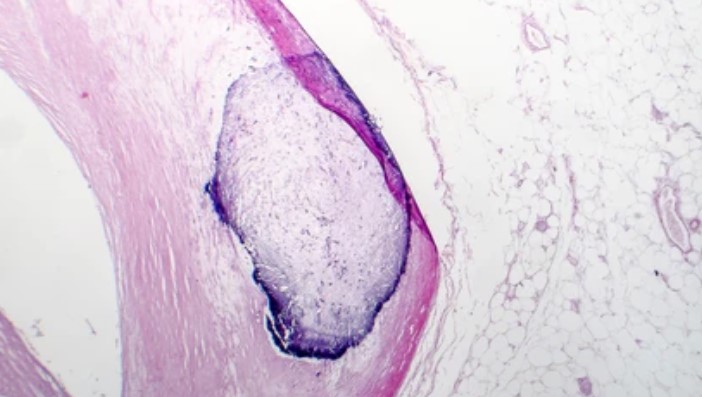It occurs when calcium builds up in body tissue, blood vessels, or organs. This buildup can harden and disrupt the body’s normal processes. Calcium is transported through the bloodstream and is found in every cell. As a result, calcification can occur in almost any part of the body. About 99 % of the body’s calcium is in teeth and bones. The other 1 % is in the blood, muscles, fluid outside the cells, and other body tissues.

Table of Contents
Types of Calcification
Calcifications can form in many places throughout the body, including:
• Small and large arteries
• Heart valves
• Brain, where is known as cranial calcification
• Joints and tendons, such as knee joints and rotator cuff tendons
• Soft tissues like breasts, muscles, and fat
• Kidney, bladder, and gallbladder
Some calcium buildup is harmless. These deposits are believed to be the body’s response to inflammation, injury, or certain biological processes. However, some calcifications can disrupt organ function and affect blood vessels.
Causes of Calcification
Many factors have been found to play a role in calcification. These include infections, calcium metabolism disorders that cause hyperkalemia, genetic or autoimmune disorders affecting the skeletal system and connective tissues, persistent inflammation.
Alkalosis
Alkalosis is excessive blood alkalinity caused by an overabundance of bicarbonate in the blood or a loss of acid from the blood (metabolic alkalosis), or by a low level of carbon dioxide in the blood that results from rapid or deep breathing (respiratory alkalosis).
Metabolic Alkalosis
Metabolic alkalosis is a primary increase in serum bicarbonate (HCO3 – ) concentration. This occurs as a consequence of a loss of H+ from the body or again in HCO3. Metabolic alkalosis is a pH imbalance in which the body has accumulated too much of an alkaline substance, such as bicarbonate, and does not have enough acid to effectively neutralize the effects of alkali.
Respiratory Alkalosis
Respiratory alkalosis is a condition where the amount of carbon dioxide found in the blood drops to below the normal range. This condition produces a shift in the body’s pH balance and causes the body’s system to become more alkaline). This condition results in rapid, deep breathing called hyperventilation.
Acidosis
Acidosis is caused by an overproduction of acid in the blood or an excessive loss of bicarbonate from the blood (metabolic acidosis) or by a build-up of carbon dioxide in the blood that results from poor lung function or depressed breathing (respiratory acidosis).
Metabolic Acidosis
Metabolic acidosis is a pH imbalance in which the body has accumulated too much acid and does not have enough bicarbonate to effectively neutralize the effects of the acid or when the kidneys are not removing enough acid from the body. If unchecked, metabolic acidosis leads to acidemia, i.e., blood pH is low (less than 7.35) due to increased production of hydrogen ions by the body or the inability of the body to form bicarbonate (HCO3 –) in the kidney.
Respiratory Acidosis
Respiratory acidosis is a condition that occurs when the lungs are unable to remove all the carbon dioxide processed in the body. The acid-base balance of the body is hampered by this, causing the blood to become acidic.
Also, Read this: Cellular swelling in cell injury